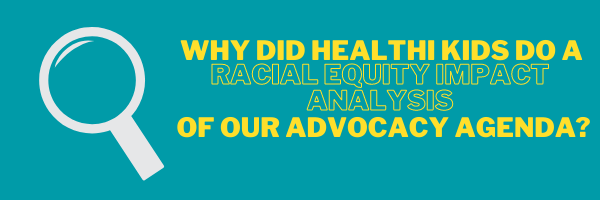May 17, 2022

Racism is a public health crisis. At Healthi Kids we have known this for over a decade. Black and Latino families in the City of Rochester experience worse health outcomes than people in the surrounding suburbs.
That’s why at the beginning of 2021, Healthi Kids launched a project with our coalition members to conduct a racial health equity impact analysis of our advocacy agenda.
What is racial equity?
Racial equity refers to what a genuinely non-racist society would look like. In a racially equitable society, the distribution of society’s benefits and burdens would more fair, and not determined by race. In other words, racial equity would be a reality in which a person is no more or less likely to experience society’s benefits or burdens just because of the color of their skin.
What is racial health equity?
Racial health equity means that we are ensuring that everyone has the chance to be as healthy as possible. It recognizes that racism currently prevents Black, Latino and other families of color from achieving their best health.
Why is racial health equity important?
We know that racism is harmful to children’s health and well-being. Studies have found that racism makes toxic stress worse in early childhood and leads to poorer health outcomes as children become older. We also know that racism is a public health crisis here in Rochester and the Finger Lakes region. Black and Latino families consistently experience worse outcomes than their white counterparts throughout the region.
What does Healthi Kids mean by “racial health equity lens”?
As a coalition we recognize that racism is a system of oppression that continues to exist and harm communities of color today. When we use a racial health equity lens and tools to examine our advocacy agenda and policy goals, we are intentionally looking at how policies, systems, institutions, practices and environments are places of embedded racism. We do this as a coalition to help eliminate racial inequities in our community and advance health equity.
What is a racial equity impact assessment?
A racial equity impact assessment (REIA) is an examination of how different racial and ethnic groups can be affected by a proposed action or decision. The REIA can be a vital tool for preventing institutional racism and for identifying new options to resolve long-standing inequities. While relatively new to the United States, it’s been used in other countries like the United Kingdom for almost two decades.
REIA tools are used mostly by governments and school districts to assess specific policies or actions they’re about to take. While not typically a tool for coalitions or advocacy groups, our team decided to use the process to examine our work more closely within a racial equity lens.
RACE Forward, the Race and Social Justice Initiative and the Racial Equity Alliance all have tools and roadmaps for organizations looking to assess current or proposed policies.
For the purposes of our work, our coalition adopted the framework provided by RACE forward to analyze our agenda.
Why did we conduct an REIA?
For over a decade, Healthi Kids and Common Ground Health have been raising awareness about the impact racism has on families across the Finger Lakes region. Working alongside families and students we have been fighting for policy change that eliminates inequality we have seen in the city. Last year, with increased police violence in our community and a heightened tensions around race relations across the nation – our coalition wanted to do more and be more intentional about connecting our work to racial health equity.
We wanted to take the time as a coalition to examine our advocacy agenda for several reasons. It’s been two years since we released our initial advocacy goals and plan. Things have changed a lot in this time – we’ve navigated a global pandemic and inequity in our community has gotten worse. As a coalition we also want to continue to be responsive to the needs of kids and families in our community – which means constantly checking in with families to make sure we’re on the right track.
We had five goals moving into our REIA process:
1. Unpack how our current advocacy agenda addresses racial health equity.
2. Address any bias that may be found in our agenda.
3. Better understand how our policy goals and proposed solutions impact Black and Latino families in our region.
4. Identify any gaps that may be found in our current agenda.
5. Amend our language and messaging to address racial health equity with more intentionality.
Over the coming weeks we’ll share more about the process and outcomes. Stay tuned for more details!
To learn more about this work please reach out to Jenn, our advocacy manager, at info@healthikids.org.

